Raising awareness, inspiring action and developing tools to help reduce food waste in Maine
A team of undergraduate students works with stakeholder partners and faculty advisors to help reduce wasted food and feed people in need.
November 2021
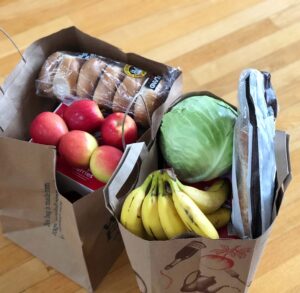 In the United States we waste 30-40% of the food we produce, Susanne Lee says in a September 2021 interview with Maine Public about food waste and climate change. That’s like buying five bags of groceries and leaving two of them behind in the parking lot, she adds. Lee is a Mitchell Center faculty fellow who leads Food Rescue MAINE, a statewide project to reduce food waste and food loss, and address food insecurity, with “triple-bottom-line” solutions that have environmental, economic and social benefits.
In the United States we waste 30-40% of the food we produce, Susanne Lee says in a September 2021 interview with Maine Public about food waste and climate change. That’s like buying five bags of groceries and leaving two of them behind in the parking lot, she adds. Lee is a Mitchell Center faculty fellow who leads Food Rescue MAINE, a statewide project to reduce food waste and food loss, and address food insecurity, with “triple-bottom-line” solutions that have environmental, economic and social benefits.
Since the project launched in 2019, students from UMaine, other University of Maine System universities and other institutions have been working with faculty advisors and stakeholder partners to tackle food waste in Maine. They’ve identified six solutions to focus on, including helping businesses track and reduce food waste, connecting farms and other food producers that have excess food with those in need, and helping schools and communities launch food recycling programs.
Becoming part of the solution
The student team focused on Solution 3 seeks to educate the public about food waste and motivate people to reduce wasted food.
In pursuit of that goal, a team of three undergraduate students—two from UMaine and one from Thomas College—is working this fall on a variety of projects. They are building on earlier student accomplishments that include launching the Food Rescue MAINE website and the “Maine Food—Too Good to Waste” campaign.
Work on Solution 3 took off in spring 2021 when Food Rescue MAINE received funding from the Maine Department of Environmental Protection’s (DEP) Waste Diversion Grants program. The project’s goals align with DEP’s Food Recovery Hierarchy, which prioritizes the ways that food is used to make the most of Maine’s resources and reduce waste. The Food Rescue MAINE project is the first statewide food waste education campaign funded by this DEP program.
Food Rescue MAINE students have been working closely with UMaine’s Division of Marketing and Communications on building and maintaining the project website, branding, and designing a social media strategy. In summer 2021, UMaine undergraduate Gabby Sands expanded and refined the website with guidance from UMaine’s Digital Communication team. Elyse St. Pierre, also a UMaine undergraduate, worked on developing educational materials for communities that have launched food recycling pilot programs, including a brochure and a collection of educational content that can be used on websites and in social media.
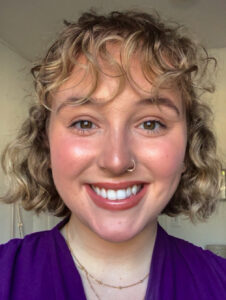
Hannah Mathieu, a UMaine junior majoring in environmental science and English who joined the project midway through the spring 2021 semester, is working on the website this fall. She’s also building on the work done last spring with elementary schools in Winslow, Readfield and Portland, helping them to create and implement strategies for reducing food waste, such as an educational postcard to go home with students in their lunchboxes. School partners are using the materials developed by the team and Mathieu meets with them regularly to learn what’s working and what can be improved.
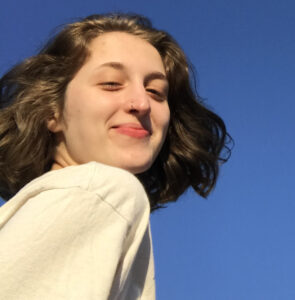
To help people connect with Food Rescue MAINE, UMaine sophomore Kalina Kinyon initiated a social media presence for the project in spring 2021 and is busy developing content and managing the project’s social sites, including Facebook, Twitter and Instagram. Kinyon is an environmental science major with a concentration in sustainability and a minor in economics.
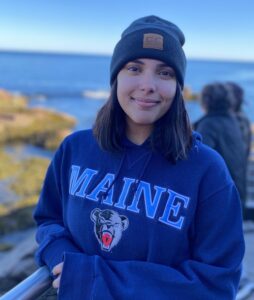
Hannah Crayton, an undergraduate at Thomas College majoring in environmental science and policy with a minor in education, has worked on several Food Rescue MAINE projects. This fall she is creating an e-newsletter that will provide resources and help people connect with others working on food waste. The project already has a sizable email list of stakeholders, partners and other supporters—more than 900 strong. She also continues to work with Maine towns that have launched food recycling programs, including Winslow, Waterville, Readfield and Portland, on their efforts to engage and educate local residents.
Real world learning and experience
“I didn’t know what a stakeholder was before I started this internship,” says Kinyon, who joined the project during the last academic year as a first-year student. “Within the first few months I’ve had to learn a lot of things fast to keep up with the other interns,” she says. “But those things, like learning how to communicate with stakeholders, following the branding guidelines for the website and social media, really helped me create a whole new space for skills that I didn’t have.”
Susanne Lee notes that she usually looks for juniors and seniors to bring on as interns, but she was struck by Kinyon’s creativity, eagerness to learn—and her persistence.
Lee’s background and experience in business, management and marketing infuse the project with a real-world focus. She wants students to find value in the internship for their own academic and professional development—building skills, making connections, taking ownership of their work—as they also move the project forward.
“Other students I know have internships where they spend a lot of time being an office assistant or just kind of shadowing other people,” says Hannah Crayton. “But this internship is very hands-on where you’re actually doing the work. I feel like I’m already working in my field.”
Along with developing new skills, the students are also tapping into a wide range of resources available to help them succeed.
Kalina Kinyon talks about the mentoring she’s received from UMaine social media specialist Samantha Perry and other social media experts on campus. She is also learning from a Maine Business School contact of Lee’s who runs a social media marketing company.
“Instead of running around and doing all this research on our own, we can often just talk to someone who can be a mentor and give you feedback on what you’re working on. I haven’t had a whole lot of that outside of this internship experience,” says Hannah Crayton. “I’m finding that people are really available and ready to help you learn.”
Real benefits for Maine communities
The students’ work provides real value for Maine as well. Lee says that the Food Rescue MAINE website serves as a statewide resource for learning about and tackling food waste in Maine—the first of its kind in the state. The coming e-newsletter will provide resources and help people learn about what’s happening with food waste in Maine and how they can connect with others working on food waste .
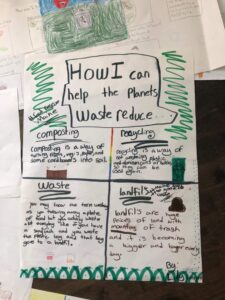
By supporting the food recycling efforts of schools, towns and cities—such as a program launched in July 2021 in Readfield in collaboration with the towns of Wayne and Fayetteville—the Solution 3 interns are helping communities save money, reduce food insecurity, and engage residents.
Susanne Lee calls these communication efforts “community marketing,” working with towns as well as libraries and other organizations to spread the word and get people involved in reducing food waste. She also notes that the resources the interns are developing, from educational materials for schools to flyers and postcards, are designed to be easily adaptable so that communities around the state can make use of them.
Learning to lead
Opportunities to step into leadership roles are not necessarily abundant for undergraduate students. The interns working on this project are developing leadership, project management, and problem-solving skills, a learning process which can feel daunting but is also empowering.
“Susanne is always talking about leading without authority,” says Hannah Mathieu, “having the confidence to talk about what you are doing, even if you don’t have that much experience and don’t have authority over people you’re working with. That’s been really valuable.”
“I think the biggest thing that this internship has done for me is to push me outside my comfort zone,” Mathieu continues. “Talking with stakeholders and people with years and years of experience is definitely a scary thing, but I’m thankful that I’ve been able to learn and practice doing it. I don’t think I would put myself out there as much as I go through my college experience if I hadn’t done this internship.”
